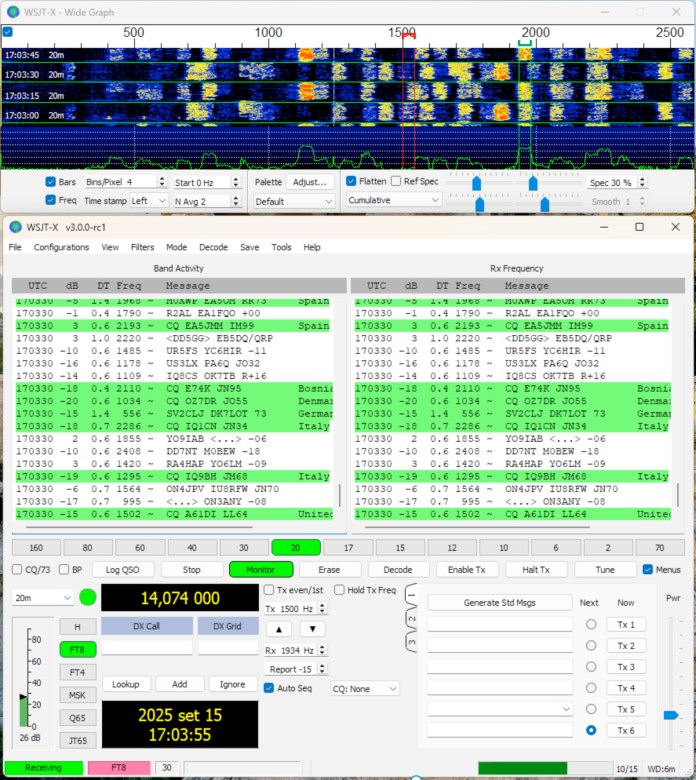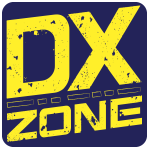The long-awaited WSJT-X 3.0.0 Release Candidate 1 is here! This major update introduces a host of powerful new features and improvements, designed to enhance your digital mode experience – whether you’re a DXer, working satellites, or playing with EME.
As a Release Candidate, this version is not yet final, but it offers advanced users a chance to test the latest innovations and provide valuable feedback. By design this Release Candidate will be nonfunctional after April 30, 2026.
WSJT-X 3.0.0 RC1 binaries are currently available for Windows, Linux and MacOS. Under Windows a free space of 566 MB is required.
If you try it out, share your thoughts and questions on the official forums – your input helps shape the final release!
What’s New in WSJT-X 3.0.0?
For Users of WSJT-X 2.7.0 and Earlier
If you’re upgrading from an older version, you’ll find many features previously exclusive to the WSJT-X Improved 2.8.0 i+ editions now integrated into the main release:

- EME Enhancements: Quick access to Echo mode and Q65 sub-modes, plus easier frequency selection.
- Single-Click Band Buttons: Enable from the View menu for faster band switching.
- Advanced Filters: Suppress specific decoded messages to reduce clutter.
- Smart Sequencing: Options like Wait and Reply, Wait and Call, and Wait and Pounce help you manage QSOs in challenging conditions -now available for all modes.
- Audible Alerts: Customize sound alerts for specific message content.
- Full Duplex Mode: Transmit and receive simultaneously.
- TCI Support: Enhanced rig control and audio routing via the Transceiver Control Interface.
- SuperHound/Fox Improvements: SuperHound operators can now activate Wait and Call for SuperFox callsigns, with warnings for frequency conflicts.
- Power & SWR Monitoring: Display transmitted power and SWR (with auto-stop if SWR exceeds 2.5).
- Band Hopping: Sequential reception on main sub-bands or custom frequencies for FT8, FT4, and MSK144.
- Auto-Deletion of Audio Files: Set saved audio files to delete after 30 days.
- CALL3.TXT Downloads: Easily download call lists for terrestrial or EME use.
- Satellite QSO Logging: New field type support and auto-logging options.
- High-Resolution Monitor Support: Better font and widget scaling.
Brand-New Features for Everyone

- Parallel FT8 Decoding: Faster performance with multi-threaded processing.
- Echo Mode: Transmit your callsign (or any 6-character group) to the Moon and decode the echo—perfect for EME enthusiasts!
- Quick Filters: Highlight transmissions from specific territories.
- MSK144 Updates: “73” messages to MyCall now appear in the right pane, with clearer TR period separation.
- Q65 VHF Improvements: Disable waterfall clicks unless the ALT key is held.
- Highlighting Options: Use orange/blue highlights for directional calls (DX, SOTA, POTA, etc.).
- QMAP & MAP65: Better handling of long compound messages and bug fixes for CQ grid issues.
Why Try the Release Candidate?
- Be an Early Adopter: Test cutting-edge features before the stable release.
- Shape the Future: Your feedback helps refine the software for the entire community.
- Prepare for the Final 3.0.0: Get familiar with the new tools and workflows ahead of time.
How to Get Involved
- Download WSJT-X 3.0.0 RC1 from the official site.
- Test the new features and report any issues or suggestions.
- Join the discussion on the WSJT-X forums or other user groups.
A Note on Stability
Remember, this is a Release Candidate—expect further updates before the final 3.0.0. Always back up your logs and settings before upgrading!
About WSJT-X
WSJT-X is a computer program designed to facilitate basic amateur radio communication using very weak signals. The first four letters in the program name stand for “Weak Signal communication by K1JT,” while the suffix “-X” indicates that WSJT-X started as an extended branch of an earlier program, WSJT, first released in 2001. Bill Somerville, G4WJS, Steve Franke, K9AN, and Nico Palermo, IV3NWV, have been major contributors to development of WSJT-X since 2013, 2015, and 2016, respectively.



Good morning, with version 3.0.0. of WSJTX the FLRIG function is no longer available in RIG. Do you know the reason? Thanks, Valter, IK1QEW